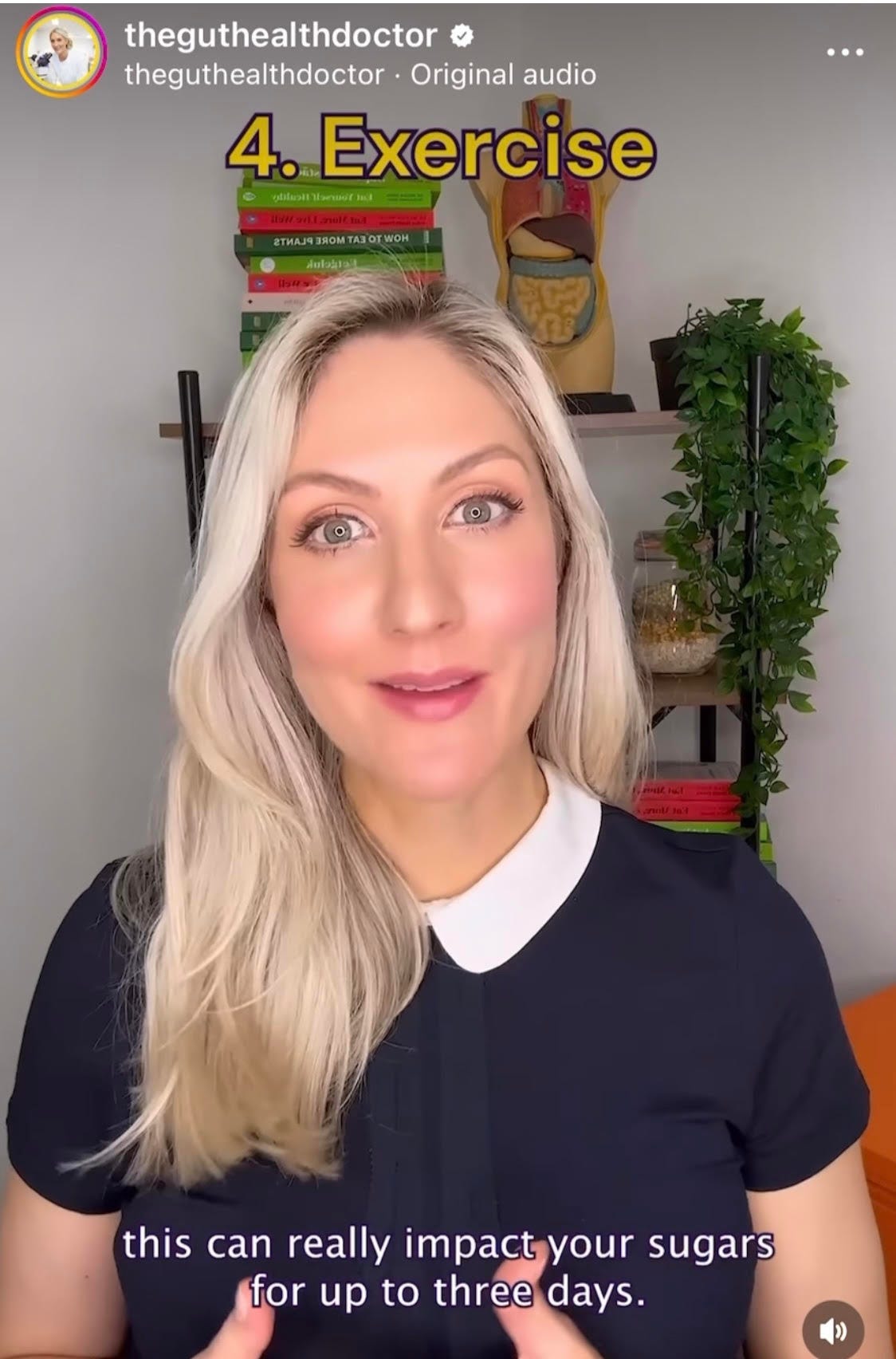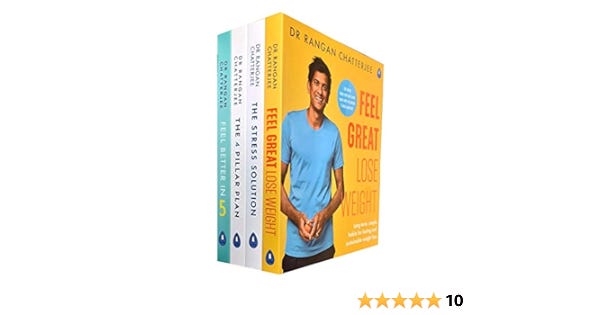I had an interesting week. I discovered that an ex-colleague had copied one of my posts on here – and used it to create her own video and write a newspaper article.
I don’t expect people not to use my (even saying “My” sounds a bit knobbish, I know) content at all. I actually think it’s great if people are able to spread the word about the limitations of CGM use. But I think copying to the extent that close to the entire content is taken, along with every key noun, example and reference is - *cough* - flagrant.
How bad was the plagiarism? You be the judge.
It goes on with lentils (snap) and protein shakes (snap), and the menstrual cycle (snap) and sleep (snap) and a Lancet study (snap).
I had so many questions about this:
· Why would a person be so obvious about copying something?
· I wonder if they’ve done this before?
· How on earth did they think they could get away with it?*
· Where's the self-respect?
· Once you’ve been found out why the jiggins would you not just own up to it and apologise?
Other people have shared similar stories of their work or ideas being taking by big-name influencers. Some of the behaviour is really appalling - especially for people who should know better (scientists cite!), and I have been asking myself why. I’ve also been asking myself if it’s really as bad as I think it is.
I have reflected on this a bit this week and I wonder whether it’s because once you commit to a career of being famous on social media, it’s probably very difficult to turn back ….[and you end up doing stupid stuff]?…….
DOING ACTUAL MEDICINE AND SCIENCE AND SHIT IS HARD*
Being a doctor is really hard work. You might make a mistake, you might misdiagnose someone, you might screw up in the operating theatre.
Also, being a health professional in the NHS right now must really suck. You actually think you’re going to be taking care of patients? Hahaha, here’s 4 hours of admin, a locked fridge, and no you can’t take a coffee break there.
Being a principal investigator (PI) in a research institution is rough. You might spend five years trying to get funding for an idea that you really believe in, and every single one of your grants is rejected. For young PIs, at least 90% of your grants are rejected. You finally get funding, do the study and your peptide doesn’t do what you thought it did…. Oops. Depending on the journal 90% of your manuscripts will be rejected at first submission. It's a career with a lot of rejection, lol.
Oh, and did I mention the pay is mostly shit? Haha. If you're a dietitian in the US or the UK the salary is mediocre, and the ceiling is low unless you move into management. Doctors also earn a lot less in the NHS than you would think. Postdocs and research fellow salaries are …. not exciting.
In all of these things when the failure occurs, it’s black and white, and can be brutal.
INTERNET FAME UTOPIA
Now imagine a world where you can launch a podcast**, spend your days chatting amiably about saunas and breathing through your nose and earning more money than you ever dreamed of.

And you can't really fail. If you make the wrong decision as the chief medical officer on vaccine policy during a pandemic, thousands of people could die. But if you have an opinion about vaccine policy on your podcast (make sure you add the disclaimer that THIS IS FOR EDUCATIONAL PURPOSES ONLY AND DOES NOT SUBSTITUTE FOR MEDICAL ADVICE so you can’t be held responsible if anything goes wrong)- you get all the attention and none of the risk!
And there’s really no internet fame “failure”. The worst that happens is that you don’t get as many followers as expected. But if you don’t, don’t worry: can I interest you in a conspiracy theory? Have you tried recording yourself working out?
And once you’ve built up your following……
DID YOU KNOW YOU CAN CONVERT PHD >>> £££ JUST BY FLOGGING SHIT ON YOUR INSTAGRAM ACCOUNT?***
Just wait until you’ve got a large enough social media following that companies are thrilled to pay you and your credentials to sell their products. £3000 to flog diet soda? £5000 to promote beef? Cereal bars? Shampoo? Face cream? YOU’VE GOT A PHD REMEMBER, AND THIS IS SCIENCE.
PARLAY YOUR INTERNET FAME INTO A BOOK!
When you're not chatting with Chris Williamson about glute bridges, use the time to write a book about diet and lifestyle. (You don't know anything about medicine, and anyway the public don't care about the aortic valve, so make sure it's about nutrition and exercise and sleep and stress, mention rapamycin and remember IT’S THE FOUR PILLARZ/360 degree medicine).
THE WORLD NEEDS MORE ONLINE EDUCATION HUBS
There are only 23,564 online medical education hubs launched by people who’ve never seen a patient and a whopping 976,927 “Understanding the Scientific Literature” digital bundles launched by people whose most substantive research experience is labeling test tubes and buying the PI coffee – WHY NOT START ANOTHER?
10 quid a month, 500 subscribers= £60,000 a year. Not bad for a side job. (And you can create all the content you need in seconds with ChatGPT now, we’ll get to that). And did you know there are still DONKEYS WHO ACTUALLY SIGN UP TO SEE PATIENTS LOL.

WAIT, YOU’RE NOT SELLING YOUR CONTENT****?
If you're not making enough cash promoting Athletic Greens (TM), and the book sales have slowed down now that Oprah’s moved onto hydroponics, consider asking for a “small donation” for your content. Patreon and substack are great options.
10,000 readers prepared to pay a quid a month? Cha-ching! And did you know there are STILL DONKEYS WHO ACTUALLY SIGN UP TO SEE PATIENTS LOL.
I'm not even being sarcastic when I say you can see the appeal of being an Internet guru with an MD an RD or a PhD.
MO’ MONEY, MO’ PROBLEMS
Once you’ve experienced the benefits of this as a side career, I can imagine the overwhelming sensation to leave drudge work behind, and embrace it wholeheartedly. How could you go back to the chore of wards? Or sitting up until 2am filling in the finance details of a grant portal?
The problem is, lots of people have realised how great being an influencer is, and you’ve got competition. So what do you do?
CREATE MORE AND BETTER CONTENT.
It’s got to be on hot topics. It’s got to be angles other people don’t have.
So now we come right back to raspberries.

I know how many years of really hard work it has taken to accumulate the expertise to be able to write the Raspberry Piece (we’re calling it that now). And because of that, I couldn't fathom taking a post by someone who’s dedicated their career to developing expertise like Jen Gunter and then just passing it off as my own just because some gynaecological product was hot news.
But maybe they didn’t do it intentionally?
Someone pointed out to me that the Daily Mail article looks like it was written by ChatGPT. I am a boomer so my explanation might be wrong, but basically this is artificial intelligence software that you can give an instruction like “should people without diabetes use CGMs and if not, why?” – and it writes it for you.
Let me just say that AI must be really intelligent since it based 80% of the article on my post, haha.
Why do we care if influencers are copying other people or using AI to create content – as long as it’s accurate, who cares?
If people are plagiarising or using ChatGPT to write something that looks pretty legit, they might well be asked to consult on that area – by a company, by private patients, especially if they’ve got a large following. But remember, they don’t necessarily know or understand anything they’ve written. Are they going to turn this cashola down? (They sell cereal bars for £££, what do you think?). Then they get in a room, and they’re asked a question or asked for advice. Would you honestly have any faith in the quality of their answer?

Numerous disclaimers
*The video and article are still up, so they did get away with it haha. The comments have been disabled though because very nice people were commenting to say “uh hold on I think I’ve seen this before somewhere”.
** I do just want to say that there are people who don’t actively see patients or do research (to my knowledge) but do a fantastic job at transmitting evidenced-based information - Giv Carvalho is an example. Likewise there are many who miraculously manage to navigate having a large social media following while being really good doctors, dietitians or scientists.
*** People disagree about whether health professionals should or shouldn’t take money to promote a product. I have some views which I won’t expand on here. I do think though that healthcare professionals can and should advise companies and organisations (I do this type of work). But again, other people disagree with this entirely. Maybe I will talk about this in another post.
****I am being really unfair here, and mostly included this bit to labour my point. Again, people disagree on this and I can completely understand when people spend time on their writing that they would like to be reimbursed for this and for their expertise. Personally, I have great jobs and am happy to write a little bit for free on the side. I MIGHT PLAN A LUX TRIP TO THE MALDIVES AND START CHARGING YOU LOT THO HAHHA.













Outstanding. We’ve discussed so many of these issues, and while plagiarism is of course unacceptable and unprofessional, the misrepresentation of someone’s expertise, sensationalism of the message, and rampant overt financial conflicts of interest are the ones that kill me. The BBC for example actually have very strict regulations on these things, then they invite Tim Spector on repeatedly to promote all his nonsense or allow Mosley to make all his ridiculous shows which promote his books, or consult Alex George about mental health so he can mention his podcast. People don’t even see the problem.
Whether it's intentional plagiarism or chatgpt it highlights a weakness of YouTubers or whatever that 'need' to make frequent content in a niche domain, they're going to run out of things to say pretty quickly and desperation/laziness will kick in for the uncreative creator.